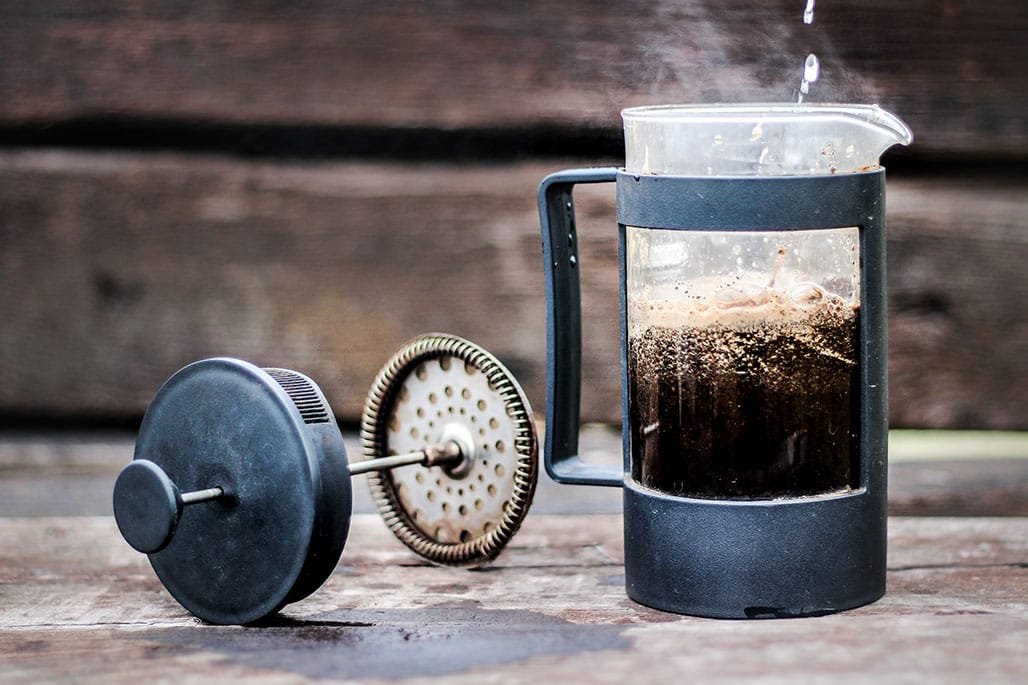Understanding French Press Coffee
The French press, also known as a press pot or plunger pot, has a rich history that dates back to the early 1900s. This method of brewing coffee is celebrated for its simplicity and ability to yield a full-bodied flavor. The French press operates on a straightforward principle: steeping coarsely ground coffee in hot water and pressing a plunger to separate the grounds from the brewed coffee. This process allows the oils and fine particles to remain in the beverage, contributing to its robust character and rich taste.
A key advantage of the French press is its unique extraction process. Unlike drip coffee makers that utilize paper filters, the French press uses a metal mesh screen that retains essential oils and micro-particles, enhancing the coffee’s flavor profile. As a result, French press coffee tends to be thicker and richer compared to other brewing methods. This is especially important when selecting the best coffee beans for French press, as those beans that produce bold, rich flavors pair excellently with the brewing technique.
To achieve the most satisfying results when brewing coffee with a French press, it is imperative to pay attention to both grind size and brewing time. A coarser grind is recommended, as finer coffee grounds can lead to sediment in the final brewed cup. Additionally, brewing time typically ranges from four to five minutes—overstepping can result in a bitter taste due to over-extraction. For enthusiasts seeking the ideal brewing experience, careful selection of the best coffee beans for French press, along with proper technique, ensures a delightful cup every time.
Characteristics of the Best Coffee Beans for French Press
Origin of the beans
When it comes to brewing the best cup of coffee using a French press, the choice of coffee beans plays a crucial role. The ideal coffee beans for French press brewing exhibit certain characteristics that enhance the overall taste and experience. One essential factor is the origin of the beans. Beans sourced from regions such as Ethiopia, Colombia, or Guatemala offer distinct flavor profiles and aromatic qualities that can elevate your French press coffee. Each origin imparts unique notes—ranging from fruity to floral or even chocolatey—contributing to a delightful tasting experience.
Roast level of the coffee beans
The roast level of the coffee beans is another significant attribute. Generally, medium to dark roasts are favored for French press brewing. Such roasts provide a fuller body and rich flavor, allowing the coffee’s natural oils to shine through. Lightly roasted beans can also be used but may result in a more acidic cup that may not resonate as well with those accustomed to richer flavors. Therefore, selecting medium to dark roast coffee is advisable for achieving the desired taste in French press beverages.
Furthermore, the grind size is fundamental when preparing French press coffee. Coarsely ground coffee is essential for optimal extraction; finely ground coffee can lead to over-extraction, extracting undesirable bitter flavors. The coarse consistency allows for a balanced extraction process during the steeping time, ensuring that the coffee captures the intended taste without the bitterness that can mar a well-brewed cup. For those looking for the best coffee beans for French press, focusing on beans with the right origins, roast levels, and grind consistency will guarantee an enhanced brewing experience.
Top Coffee Bean Varieties for French Press
When it comes to brewing coffee with a French press, selecting the right coffee beans is crucial to achieving a rich and flavorful cup. Various coffee bean varieties offer unique flavor profiles, acidity levels, and aromas, making it essential to explore the best options available on the market. Here, we delve into a selection of top coffee bean varieties that thrive in it preparation.
First on the list is the renowned Ethiopian Yirgacheffe. This single-origin bean is celebrated for its bright acidity and floral notes, often accompanied by flavors of citrus and berries. The complexity of Yirgacheffe beans makes them a favorite among those who appreciate a vibrant, aromatic cup of coffee. Its medium roast usually works beautifully in a French press, allowing the oils and fine particles to infuse the water for a rich extraction.
Next, we have Colombia Supremo, a coffee varietal known for its balanced profile. With a medium body and mellow acidity, this bean delivers sweet caramel and nutty undertones, appealing to a wide range of taste preferences. Its consistent quality and smooth finish make it an excellent choice for French press brewing, accentuating its depth and flavor.
Moving to Central America, Guatemalan Antigua beans stand out for their unique characteristics. These beans yield a full-bodied cup with rich chocolate notes and a slightly smoky aftertaste. The vibrant acidity enhances the overall complexity, making Guatemalan Antigua a delightful option for those seeking a robust experience with their French press coffee.
Lastly, consider Brazilian Santos, a blend known for its low acidity and smooth, mellow flavor profile. Often featuring notes of chocolate and nuts, this coffee is ideal for those looking for a soothing and comforting brew. The creamy texture of Brazilian Santos complements the French press method wonderfully, creating an indulgent drinking experience.
These diverse coffee bean varieties offer an array of flavors and characteristics, ensuring that coffee lovers can find the best coffee beans for French press brewing tailored to their preferences. Each choice brings something unique to the table, celebrating the rich traditions and climates from which they originate.
How to Choose and Brew the Perfect French Press Coffee
Choosing the right coffee beans for French press brewing is critical to achieving an exceptional cup of it. The key lies in personal taste preferences, as flavor profiles can vary significantly among different varieties of coffee. For the best results, prioritize high-quality coffee beans that are freshly roasted. Arabica beans are often favored for their smooth and delicate flavors, while Robusta beans can offer a stronger and bolder taste. Consider experimenting with blends or single-origin beans to find the profile that resonates most with your palate.
When it comes to brewing, the coffee-to-water ratio plays a vital role in the final outcome. A common recommendation is to use a ratio of 1:15, which means one part coffee to 15 parts water. Adjust this according to strength preference; for a stronger brew, a ratio closer to 1:12 can be effective. Ground coffee should be coarse to prevent over-extraction and sediment accumulation; a burr grinder can help achieve a uniform grind.
Optimal brewing time is also essential, and it typically ranges from 4 to 5 minutes. Start your timer once you pour heated water over the coffee grounds. Water temperature should be around 200°F (93°C), just below boiling. This allows the coffee beans to release their oils and flavors without scalding them.
Maintaining your French press equipment is crucial for consistent flavor and longevity. Regularly clean your press after use to prevent the buildup of oils and residues, which can affect the taste of your coffee. Use warm, soapy water and avoid abrasive materials. Lastly, do not hesitate to experiment with different types of coffee beans for French press brewing. Every variety offers unique flavors and aromas, making it enjoyable to find your ultimate cup.




